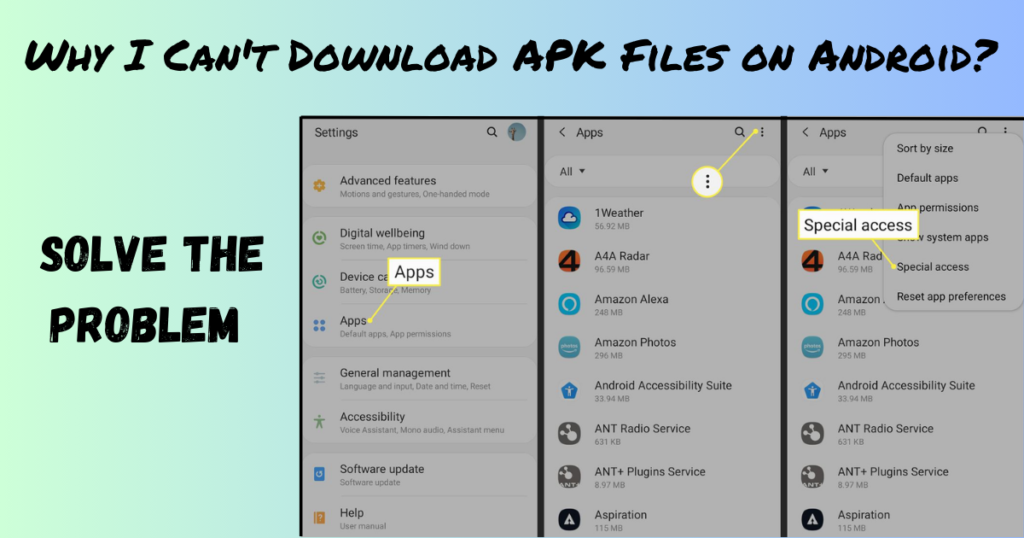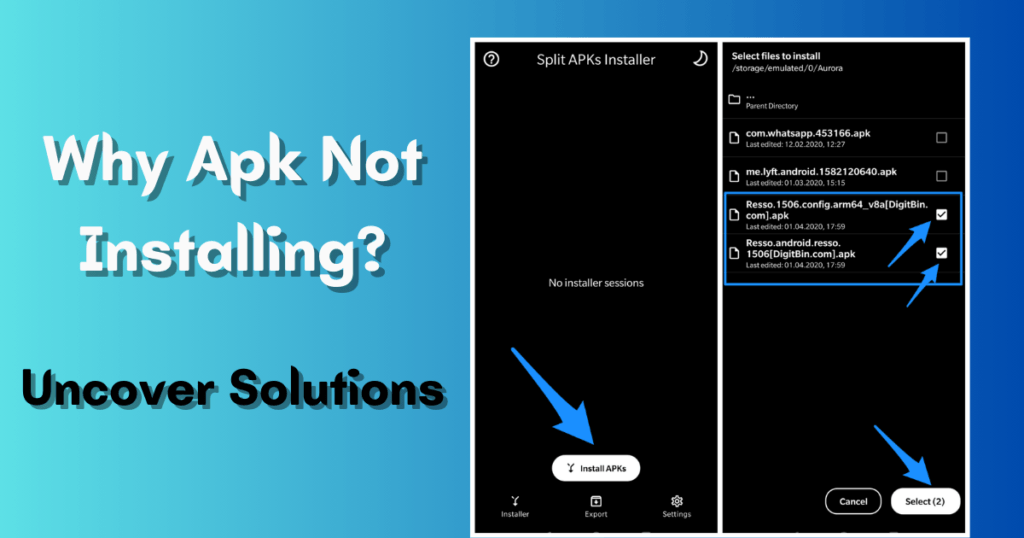Is your APK failing to install? This happens if there are compatibility issues. Or if there are not enough permissions. Corrupted or incomplete download files. They can also stop installation.
Installing an APK file on your Android device can be frustrating. This can happen when the process fails. This happens often due to many factors. They can hinder the installation of your desired app. The APK and your device’s OS must be compatible. A mismatch can make the app unusable.
Permissions are key. Android requires explicit permission. You need it to install apps from unknown sources. Also, the APK file‘s integrity is key. An APK was partly downloaded. It was corrupted during the transfer. It will not install right. So, ensuring a reliable download is key. It is also important to get all the data.
It’s also worth checking that your device has enough storage. Also, check that the APK is the latest version to avoid old issues. Let’s explore why Apk Failing to Install.
Common causes for an APK failing to Install
Welcome to the world of APK failing to install. Sometimes, APKs fail to install on devices. This frustration often stems from a variety of issues. Knowing the main causes can help fix these issues. They affect installation. Let’s dive into the usual suspects. They stop your APK from getting cozy with your device.
Inadequate Storage Space
Running out of room? Your device needs enough space to unpack and install an APK. Here’s how little storage can block installations:
- The installation process requires extra space.
- Device performance might degrade when full.
- The system reserves space for its updates and cache.
Check your storage. Go to the device’s Settings > Storage. Make room by deleting unused apps or media files.
Corrupted or Incomplete APK Files
A corrupt APK is like a puzzle with missing pieces. It just won’t work. Reasons include:
- Interrupted download process.
- Malicious alterations.
- Errors in the file transfer.
Tip: Re-download the APK or verify its source to ensure integrity.
Incompatible App Version
Your device and the APK might not be a perfect match. Compatibility issues arise when:
| Device Factor | APK Factor |
|---|---|
| Operating system version. | App’s required OS version. |
| Device hardware capabilities. | App’s hardware requirements. |
Check the app’s requirements. Ensure the APK fits your device specs.

Prerequisites Before Installation
Installing an APK file should be straightforward. Many users face pitfalls without the right setup. Let’s cover the key steps. They ensure a smooth installation.
Verifying App Requirements
Every app has specific needs to work properly. Here’s how to check and match them:
- Operating System: Confirm the APK is compatible with your Android version.
- Device Capacity: Ensure enough storage for the app to install.
- RAM: Some apps need more memory to run smoothly.
Enabling Unknown Sources Option
Android devices block non-Play Store installations. Follow these steps to allow them:
- Go to Settings.
- Tap on Security.
- Switch on Unknown Sources.
Remember to only download from trusted sources. This will keep your device safe.
Ensuring A Stable Internet Connection
APK files may need internet access. This is for downloading or storing extra data. Here’s what to do:
| Action | Reason |
|---|---|
| Connect to Wi-Fi | Provides a stable speed for larger files. |
| Avoid mobile data | Prevents additional charges and interrupted downloads. |
Troubleshooting Steps to Resolve Installation Issues
APK Failing to Install on your device? You are not alone. Many users encounter installation issues with APKs. But don’t worry; we’ve got some fixes to try.
Clearing Cache and Data of Package Installer
Cached data can cause problems. It’s like old cookies that need clearing:
- Open Settings on your device.
- Tap on Apps or Application Manager.
- Find and select Package Installer.
- Tap Storage.
- Hit Clear Cache and Clear Data.
- Try installing the APK again.
Checking For OS Updates
An outdated OS can be the culprit. Let’s make sure it’s up to date:
- Go to Settings.
- Select About phone or System updates.
- Check for any available updates. Download and install if there’s any.
Restarting The Device
Sometimes, a simple restart is all it takes:
- Press and hold the Power button.
- Select Restart or Reboot.
- Wait for the device to power back on.
- Attempt APK installation once more.

Advanced Solutions for Persistent Problems
Having issues when an APK fails to install can be frustrating. This is true if the problem persists. Even if you tried basic troubleshooting. A deeper look can find better solutions. They can fix these hard installation problems. Let’s explore some techniques. They will get your apps up and running well.
Using APK installers and managers
Other apps can also install APK files. Third-party APK installers and managers call them. These tools can overcome installation hurdles. Built-in package installers might face them. To proceed:
- Download a trusted APK installer from the Play Store or a trusted website.
- Browse for the APK file within the tool’s interface.
- Follow the instructions on the screen. They will guide you through the installation.
Check that your chosen APK manager has good reviews. It should be reliable.
Repairing Sd Card Issues
Corrupt or misconfigured SD cards can cause them to fail. They can cause APKs to not install. If the app is set to install on the SD card, consider:
- You must unmount the SD card. Then, you must remount it in your device’s settings.
- Run chkdsk on a computer if it supports SD card access externally.
- Formatting the SD card on your device as a last resort (backup data first).
A working SD card could be the key to installing apps.
Restoring factory settings as a last resort
Factory resets can fix deep software issues. These issues prevent APKs from installing. This should be your last option due to the deletion of all data. To restore factory settings:
- Back up all important data. This includes contacts, messages, and media files.
- Go to the ‘Backup and reset’ section in your device’s settings.
- Select ‘Factory data reset‘. Follow the instructions to reset the device.
After the reset, attempt the APK installation once more.
Avoiding future installation hiccups
Everyone hates the annoyance. It’s when an APK fails to install. You find the perfect app, but it just won’t install. Let’s ensure that never happens again. Follow these steps. They will help you avoid the stress of installation errors.
Sourcing APKs from reliable websites
The source of an APK file makes a big difference. Only download APKs from trusted sites. Trusted sources reduce malware risk. They also ensure you get a working version. Here’s a list of tips:
- Check website reputation before downloading.
- Look for an official website or verified partner.
- Read user reviews to gauge their experiences.
Regularly Updating Your Device
Keeping your device up-to-date is crucial. Updates often fix bugs. These bugs prevent APKs from installing. Here’s what to do:
- Go to Settings on your device.
- Tap on System, then System Update.
- Install any available updates.
Managing Device Storage Efficiently
Lack of storage is a common cause. It often leads to installation failures. Free up space so your APK has room to move in. Use these strategies:
| Method | Action |
|---|---|
| Clean Up | Delete unused apps and clear cache. |
| Manage Media | Transfer photos and videos to cloud storage. |
| App Data | Remove old files from downloads and other app folders. |

Frequently Asked Questions for APK Failing to Install
What can cause an APK to fail during installation?
APK installation might fail for a few reasons. First, files could be corrupted. Second, the Android version might not be compatible. Third, there may not be enough storage space. Lastly, if installation from unknown sources is off, it won’t work. Checking these factors can help resolve the issue.
Why Does My APK Not Install?
An APK may not install due to many issues. These include not enough storage. Also, an old app version, a corrupt file, and wrong app permissions. Or, disabled installation from unknown sources. Ensure to check these factors.
What to check if an APK is failing to install?
Make sure your device has enough storage. Also, check that the APK works with your Android version. Also, check that you have enabled the installation from unknown sources. Also, scan the APK for corruption. Check for authenticity issues. Then, try again.
How to Fix A Corrupt Apk Installation?
If the APK file is corrupt, delete it. Then, try downloading it again from a trusted source. Check the source is legitimate. This avoids security risks. Installing from a reliable source ensures a smooth installation.
Can an outdated Android prevent APK installation?
An old Android version can block APK installation. Some apps require a newer OS to run. You must check the app’s requirements. Then, update your Android to a compatible version. This will fix the installation issue.
Conclusion
Wrapping up. Finding the hiccup with an APK failing to install is often due to a few common issues. Checking for security blocks can prevent them. Also, it keeps device storage healthy. You should also ensure software compatibility. Find and fix issues quickly. This will keep your phone smooth. It will be free of frustration.
Happy installing! Follow the instructions above. They will help you resolve APK install issues.


